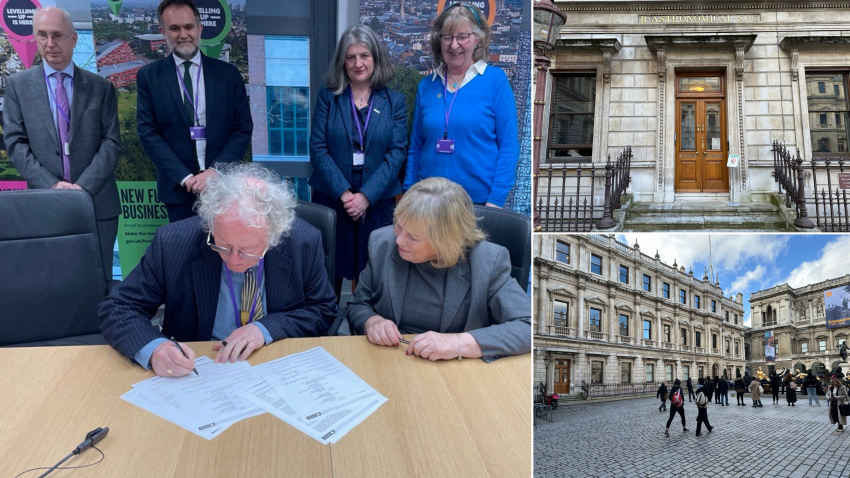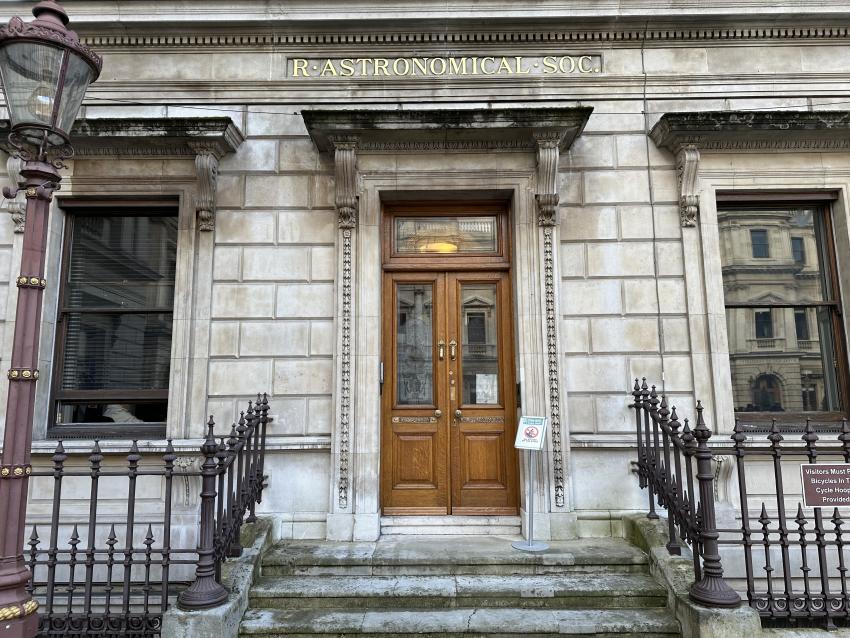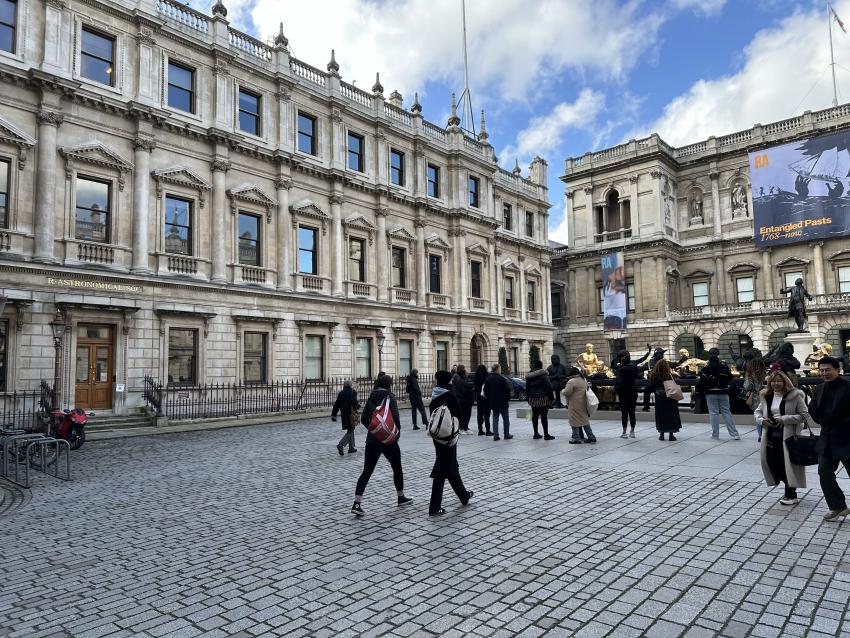The Royal Astronomical Society (RAS) is delighted to announce that an agreement has been reached with the Government to secure a 999-year leasehold on the Society’s headquarters in London.
It protects the 150-year-old scientific and cultural ecosystem at Burlington House by transferring ownership of the 19th century building to the Learned Societies that call it home, including the RAS, the Geological Society (GSL), the Linnean Society (LSL), the Royal Society of Chemistry (RSC) and the Society of Antiquaries (SAL).
In return for the leasehold at a peppercorn rent, the RAS and its Learned Society neighbours will together make a one-off payment to the Department of Levelling Up, Housing and Communities (DLUHC).
The Societies have also agreed an expanded programme of outreach activity to drive the Levelling Up agenda by reaching groups and communities who may not otherwise have the opportunity to engage with their collections and their work.
RAS president Professor Mike Edmunds said he was “over the Moon and jumping a couple of galaxies” following the agreement.
“I am absolutely delighted that for the foreseeable future we will be able to keep our headquarters in Burlington House, surrounded by our fellow Learned Societies,” he added.
“This agreement protects 150 years of our history by ensuring the preservation of our precious library, archives and instrument collection.
“But equally as exciting are the possibilities it opens up for the future, including the potential for innovative public events involving all the Societies around the Courtyard.
“We can also continue to invest in developing the facilities at our central London base – which is so helpful in bringing together our membership on a regular basis – as well as stepping up our activities across the United Kingdom.”
Trustees of the RAS - after careful consideration of the options - concluded that the new deal was not only good value for money but also provided long-term security that will allow the organisation to fulfil its charitable purposes into the future.
Prior to the agreement, the Learned Societies’ place at Burlington House had been under threat because of unaffordable rising rents, but the new deal provides them with a permanent home and protects a national asset for science and heritage.
The scientific hub, which sits at the heart of London’s Piccadilly and is also the residence of the Royal Academy of Arts, was built by the Government in the 19th century to support the work of the Societies that call it home.
Designed to bring people together to disseminate knowledge and serve the public interest, today the ecosystem at Burlington House is playing an important role as the world looks to solve pressing challenges.
From mitigating climate change and biodiversity loss, to understanding the origins of our universe and developing new methods to use the Earth’s resources sustainably, the building is where historical understanding and scientific discovery converge to help find the answers.
With a secure home and continued support from their members and funders, the Societies can now collectively build on their extensive public engagement work, continue to foster research, promote learning for all and inspire and engage communities across the UK and beyond.
Under the new deal, responsibility for the fabric of the building will also transfer from the Government to the charitable organisations, allowing them to focus on ambitions to make their headquarters more accessible and sustainable.
Baroness Scott of Bybrook OBE, Parliamentary Under Secretary of State at the Department of Levelling Up, Housing and Communities, said: “This is a great deal which gives the Learned Societies a strong foundation for the future, and delivers good value for taxpayers at the same time.
“We have been working hard to ensure that they can continue to deliver their valuable contribution to public life, and I am pleased that they now have a permanent home, making these important collections accessible to more people – especially young people.”
Ruth Allington, president of the GSL, said: “Our London base hosts an extensive programme of scientific conferences, meetings, public events and exhibitions, as well as our library and collections.
“This agreement enables us to continue to provide a base for geoscience to thrive, as well as to look forward to welcoming many more thousands of visitors to Burlington House over the coming decades.”
Professor Anjali Goswami, president of the LSL, said: “We are delighted to join with the rest of the Courtyard Societies and secure the future Burlington House as a centre of science and heritage.
“The building is not only home to our unique collection, but a hub for our national and international work to understand, value and protect the natural world.
“For the Linnean Society, this deal begins a new stage in our evolution, allowing us to invest in our building and make it more sustainable and accessible.
“It provides a foundation for our strategy to manage our collections and engage with our members and the public to work on behalf of the natural world.”
RSC CEO Dr Helen Pain said: “We welcome the opportunity to secure our long-term occupancy of New Burlington House.
“The outcome of the discussions with the Government enables the continuation of our work in support of our charitable purpose.
“We have taken care to consider all options and make an informed decision based on the priorities of our Society and we are looking forward to the next chapter and working with our neighbours around the Courtyard.”
Professor Martin Millet, president of the SAL, said: “The Society of Antiquaries is delighted to see the long-running issue of its lease at Burlington House successfully resolved with the Government.
“This will enable the Society to further develop its work in supporting research into the human past and communicating such knowledge to a broad and diverse public. We are very grateful to the wide spectrum of people who have actively supported our campaign to achieve this.”
Media contacts
Sam Tonkin
Royal Astronomical Society
Mob: +44 (0)7802 877700
Robert Massey
Royal Astronomical Society
Mob: +44 (0)7802 877699
Images and captions
Image: Burlington House lease agreement signing
Credit: DLUHC
Caption: Professor Mike Edmunds, president of the Royal Astronomical Society, signs the Burlington House lease agreement with Baroness Scott of Bybrook OBE, Parliamentary Under Secretary of State at the Department of Levelling Up, Housing and Communities.
Image: Burlington House 1
Credit: The Royal Astronomical Society
Caption: The Royal Astronomical Society’s headquarters at Burlington House in London.
Image: Burlington House 2
Credit: The Royal Astronomical Society
Caption: Burlington House is home to the Royal Astronomical Society, the Geological Society, the Linnean Society, the Royal Society of Chemistry, the Society of Antiquaries and the Royal Academy of Arts.
Notes for editors
About the Royal Astronomical Society
The Royal Astronomical Society (RAS), founded in 1820, encourages and promotes the study of astronomy, solar-system science, geophysics and closely related branches of science. The RAS organises scientific meetings, publishes international research and review journals, recognises outstanding achievements by the award of medals and prizes, maintains an extensive library, supports education through grants and outreach activities and represents UK astronomy nationally and internationally. Its more than 4,000 members (Fellows), a third based overseas, include scientific researchers in universities, observatories and laboratories as well as historians of astronomy and others.
The RAS accepts papers for its journals based on the principle of peer review, in which fellow experts on the editorial boards accept the paper as worth considering. The Society issues press releases based on a similar principle, but the organisations and scientists concerned have overall responsibility for their content.




